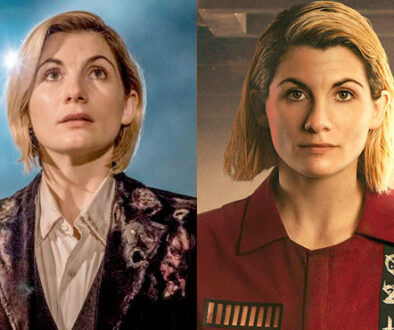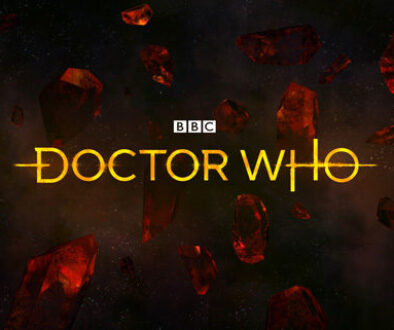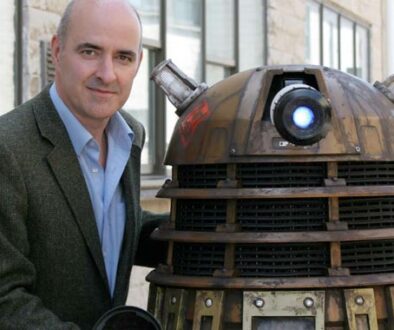“The Haunting of Villa Diodati” Review – Horror-ble
Clint Hassell and Clint Hassell give their SPOILER-filled commentary on the eighth episode of Series 12.

Fair warning: I hated this episode.
That’s unfortunate. The general response on Twitter seemed really positive, glowing even.
Yeah . . . [exasperated breath]
So, am I here to help you savagely criticize this episode and prove everyone wrong?
No! My goal is never to ruin an episode for someone who enjoyed it! I take pride in offering unique commentary that gets readers to reexamine their viewpoints, and I love helping people to better appreciate what they had considered to be a “meh” episode.
Like, “Can You Hear Me?,” last week?
Yes! “Can You Hear Me?” was way better than people give it credit for! The same goes for “Kerblam!” and “Praxeus” (and, yes, even “Love & Monsters”).
And this week . . . ?
Oh, hell no. F— this episode.
That bad, huh?
I literally couldn’t care less about this story. I’ve only seen it once, but I’m going to say it’s my new least favorite episode.
Wow. Even over “Sleep No More”?
OK, I wouldn’t go that far. On Clint’s Scale of Hatred™, I’d put “The Haunting of Villa Diodati” as more hated than “Journey to the Centre of the TARDIS,” but less hated than “Kill the Moon.”
That’s still pretty bad.
And that’s why you are here: you represent the me that’s seen this episode more than once. Hopefully, you can help me see what I missed.
If nothing else, our dialogue can provide some levity, so your critical analysis isn’t so crushing.
Plus, having you here will make writing this week’s column more fun.
Fair enough! So, guide me through your initial thoughts. Why is “The Haunting of Villa Diodati” so terrible?
Mainly, because it completely fails as a “historical” episode of Doctor Who. Not only is there very little educational content regarding the real-life historical figures, the narrative fails to celebrate its guest cast. In the episode’s most on-the-nose moment, the Doctor excitedly proclaims her desire to “witness some of the most enlightened minds of a generation at their pinnacle, the absolute zenith of their creativity.” The butler rolls his eyes and opens the drawing room door to reveal Lord Byron and his guests frolicking drunkenly on the floor.

Oh, they weren’t drunk. They were high.
What? Really?
Yeah, it’s well-documented that Lord Byron and his guests spent that summer high on laudanum, a tincture of opium. It’s part of the reason why they were able to whip each other into terrified hysterics with their horror stories.
Huh. Funny how they left that part out of the episode! Anyway, the narrative cuts to the group dancing. Paired with the Doctor, Lord Byron states, “I detest all gossip, you understand. Utterly abhor it” – – at which point the scene shifts to a montage of gossip regarding Byron and his guests!
See, I thought that was pointedly ironic.
It’s an infodump of gossip! Mary is not yet married to Percy Shelley, yet she refers to herself as “Mrs. Shelley.” Lord Byron cannot return to England, because he is separated from his wife; instead, he is having an affair with Mary’s stepsister, Claire.

Apparently, “wibbly-wobbly timey-wimey ball of stuff” can be used to describe the messy tangle of relationships, here.
Not only does the episode not explore what made Byron or the Shelleys great writers, it doesn’t even portray them as good people. Yet, the Doctor espouses that their “words matter,” and postures that Byron and the Shelleys are so pivotal to history that Ryan’s future would blink out of existence should their literary legacies be lost.
The episode misses some really interesting historical points, too. For example, the same storytelling exercise that gave rise to Mary Shelley’s Frankenstein was also the genesis for John Polidori’s “The Vampyre” – – the first modern vampire story.
And that’s my point: after this scene, there is nothing within the narrative that applies to these characters as real-life people. They could just as easily be fictional characters, and that’s a waste of a historical episode.
Well, there is the hint that a Cyberman was the inspiration for Mary Shelley’s Frankenstein.
Which, sure, is clever – – but that connection has already been drawn in several Doctor Who audio dramas by Big Finish. Here, the idea is barely explored, beyond the Cybermen and Frankenstein’s monster being creatures cobbled together from parts, blurring the line between man and mechanism. “What is a Cyberman?” Mary questions. “Someone altered,” the Doctor responds, “Organs, flesh, surgically replaced with mechanical parts without consent. It drives them insane, so they alter the brain, too – – switch off all emotion.” In a later scene, Mary asks the Cyberman, “Are you several men? A composite of parts?” before noting, “I still see a soul in there.”
True story: I thought that Ashad the Cyberman stated that his name was “asshat.”
“The Haunting of Villa Diodati” could’ve been like Series 4’s “The Unicorn and the Wasp,” and offered a clever, in-universe explanation for the Year Without a Summer. Instead the incident is blamed on a Cyberman – –
– – who then also becomes the inspiration for Frankenstein.
Of all the places the Cyberium could’ve ended up, it appears at Lake Geneva, in 1816? Too much happens with too little explanation, making all of this seem incredibly coincidental – – and that’s not good.
So, you’re saying the bones of a story are there, but it really needed to be fleshed out?
You’re terrible. But, yes. Worse, the narrative misses some really unique opportunities. Lord Byron’s daughter, Ada Lovelace, featured in Part Two of Spyfall, earlier this series, yet is barely mentioned, here. Also, the episode devotes time to Polidori’s insomnia – – a trope from which the real-life Polidori did not suffer – – but never draws the natural comparison between that “affliction” and vampirism.
It does feel like the “historical” aspects of the story get undermined as the narrative switches focus to set up the finale, in the episode’s later half.
And that shift in focus is a major problem – – the episode doesn’t know what it wants to be. Too many things get brought up and never dealt with, including Polidori challenging Ryan to a duel, Byron’s fascination with artifacts of war, how the “evil” in the house kept the Doctor from thinking clearly, and the comparison of the Doctor to the Universe.
At least “The Haunting of Villa Diodati” works as a horror episode.
Does it? I mean, it certainly throws all of the standard horror tropes into the mix: jump scares, a thunderstorm, ghostly specters appearing in flashes of lightning, levitating objects, gusts of wind blowing out everyone’s candles.
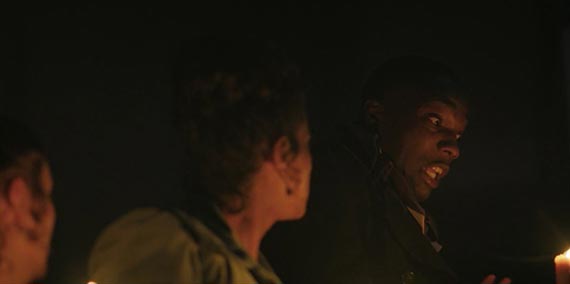
Did they ever explain why the skeleton hand could move on its own?
Oh, the bony hand! I’d completely forgotten that thing was even in this episode. I thought that was a Dream Crab from “Last Christmas,” when it first appeared. However, this is a good example of how “The Haunting of Villa Diodati” lacks focus. The hand is supposed to be terrifying, but the scene where it chokes Ryan and is subsequently swatted by the butler’s serving tray is played for laughs.
The inconsistent tone affects characterization, too. The Doctor has never believed in supernatural phenomenon, yet the script requires her to insist that the house is “unrelentingly evil” and hint that ghosts might actually exist, in order to establish initial mood and a final knowing wink to the audience. It’s insulting.
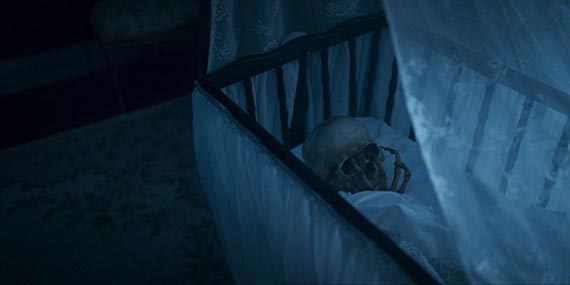
Was there anything about the episode you did like?
Again, Yaz continues to be Who’s best-written character. The young police officer sees Claire pilfer a knife, follows her to investigate, stops Claire from breaking into Byron’s study, and encourages the girl to simply ask Byron of his intentions. “I have,” Claire remarks, “his answers only increase the enigma.” “I know someone like that,” Yaz remarks. Not only are Yaz’s actions in line with her backstory, her comments further the storyline that the two younger companions are beginning to question their choices to travel with a very secretive Doctor.
The use of a perception filter was cool in concept, if not in execution. I also appreciate the novel idea that, knowing of the writer’s eventual death by drowning, the Doctor could psychically project an image of Shelley’s demise into his mind – – especially when this reveal is paired with the Tenth Doctor’s “I’m sorry, so very sorry.”
Oh, and I really like how an angry Doctor determinedly states that she “will not lose anyone else” to the Cybermen – – fitting, after losing Adric, Danny Pink, Brigadier Lethbridge-Stewart, and Bill Potts to the threat.
While I also like Jodie Whittaker’s performance in that scene, the line itself has the opposite effect for me. The Doctor’s most recent former companion was cyber-converted, so, Graham, Ryan, and Yaz are relatively safe in the finale, at least from the Cybermen, no? Surely, they wouldn’t end a companion’s tenure in the same way twice!
After a series-and-a-half of Thirteen being unfailingly friendly and warm, it is nice to see her chastise her companions: “[S]ometimes this team structure isn’t flat. It’s mountainous, with me at the summit, in the stratosphere, alone. Left to choose. . . . Watch people burn now, or tomorrow. Sometimes, even I can’t win.”
Yes, however, it’s one freaking Cyberman, who’s not even fully-functioning, and who keeps getting teleported away. Why is she not looking at options? How is she planning on getting the Cyberium out of Shelley in the first place? Let the Cyberman do it? Won’t it kill Shelley anyway? The Doctor is acting as if the stakes have never been higher, but the logistics haven’t been laid out within the narrative to justify her reaction. This speech, while lovely at first glance, covers a narrative flaw.
Oh, “The Haunting of Villa Diodati” has a lot of narrative issues. The Cyberman is recharged when it is struck by lightning – – itself a lazy trope – – yet this doesn’t also singe the Doctor. The Cyberium, a database of Cyberman historical and technical data, somehow gives reality-warping powers to Shelley.
What about when the Cyberman threatens to destroy the entire planet with his ship, despite the fact that he’s the last of his kind, and we’ve never seen the Cybermen have quite that level of power before. “Maybe, it’s a bluff,” you say, “Who knows?” Oh, that’s right, the Doctor, who has the information of the Cyberium in her head. Shelley could glimpse the upcoming horrors of all-out cyber-war, but somehow the Doctor just flounders, helpless. I rolled my eyes so hard, I thought I’d gone blind.
Worse, she gives the lone Cyberman the Cyberium and he teleports away, taking the Year Without a Summer – – which now apparently lasts less than one day – – away with him. So much for not changing the timeline!
Anything else you want to hate on, before we caption some photos?
Shelley’s terrible hairpiece makes the green “Orphan 55” wigs look sensible by comparison:

Random Musings
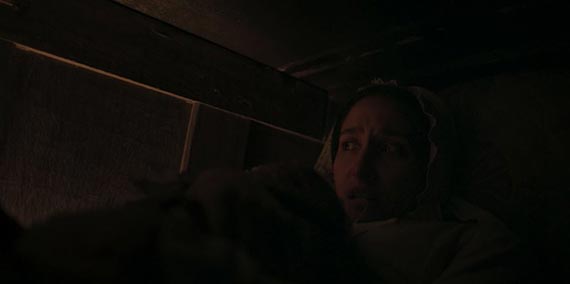
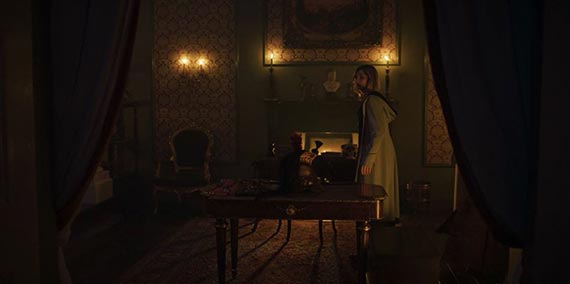
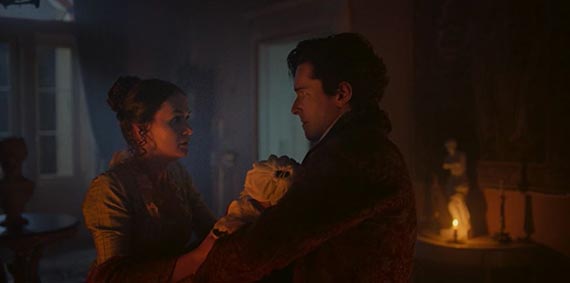

Oh! Can I write the (Time) Capsule Review?
Be my guest.
Failing to accurately represent – – much less celebrate – – its historical guest stars, and hindered by the need to set up the finale, “The Haunting of Villa Diodati” is like Frankenstein’s monster, composed of disparate parts, and failing to find life of its own.
Don’t be cute. And don’t try justifying this episode as “so meta it’s brilliant.”



